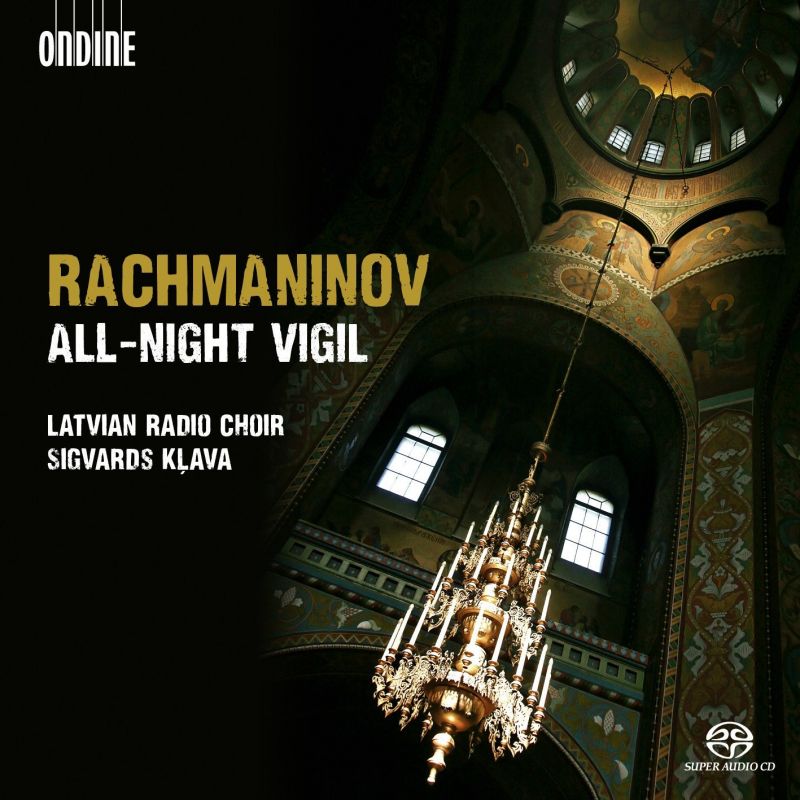RACHMANINOV All-Night Vigil
Malcolm Riley is awed by a sublime recording of Rachmaninov’s choral Vespers
View record and artist detailsRecord and Artist Details
Composer or Director: Sergey Rachmaninov
Genre:
Vocal
Label: Ondine
Magazine Review Date: 02/2013
Media Format: Super Audio CD
Media Runtime: 0
Mastering:
Stereo
DDD
Catalogue Number: ODE1206-5

Tracks:
| Composition | Artist Credit |
|---|---|
| All-Night Vigil |
Sergey Rachmaninov, Composer
Latvian Radio Choir Sergey Rachmaninov, Composer Sigvards Klava, Conductor |
Author: Malcolm Riley
Although the symphonies, concertos and piano works have re-attained their rightful places in the repertory, one must not overlook the importance of Rachmaninov’s mastery of choral writing. Regarded as one of the most challenging pieces to perform in the a cappella repertory, his monumental All-Night Vigil is really the last great crowning achievement of Russian Orthodox choral music, a masterpiece from a composer at the peak of his creative powers.
Composed in less than two weeks, early in 1915, Rachmaninov dedicated the Vigil to the memory of Stepan Smolensky, who had introduced him to the glorious legacy of the vigil through his work as director of the Moscow Synodal Choir from 1886 to 1901. This all-male choir’s first performance of the work, in March 1915 under Nikolay Danilin, was enthusiastically received by the audience and critics alike. Alexander Kastalsky thought the Vigil was ‘a contribution of great importance to our church’s musical literature…Of unusual value is this artist’s loving and conscientious attitude towards our church chants, for in this lies the promise of a splendid future for our liturgical music.’ Alas, this would not be the case. The post-revolutionary Bolshevik authorities drove religious expression underground and the Moscow Synodal School and its Choir were disbanded. The Vigil remained unrecorded for half a century until 1965, though some 30 commercial recordings have been made since, including the disc under review here, which was made in St John’s Church, Riga, in May 2011.
Rachmaninov set 15 texts, which span Vespers through Matins to Prime. Nine of the movements were based on traditional Orthodox chants, including not only some of the ancient Znamenny chants but also more recent Greek and Kievian chants. Every human emotion is encompassed within the Vigil’s pages: praise, meditation, penitence and, finally, proclamation. It makes huge demands on singers’ intonation and breath control, and requires a wholehearted engagement with the texts. Needless to say, the Latvian Radio Choir produce an exhilarating performance, a worthy successor to their earlier recording (also for Ondine) of Rachmaninov’s other great unaccompanied choral masterpiece, the Liturgy of St John Chrysostom of 1910.
Since the score’s tempo directions lack any metronomic indications, conductors have to judge carefully how to negotiate the work’s many gear changes and dynamic topography. Sigvards Kl‚ava’s spacious approach pays great dividends. Although his tempi are appreciably slower than those of that other first-rate performance, by the Estonian Philharmonic Chamber Choir under Paul Hillier for Harmonia Mundi, Kl‚ava’s interpretation doesn’t give the sensation of dragging. This is because Kl‚ava resists the temptation to linger at the many pauses. He carefully draws out every dramatic nuance from this choral feast. His two dozen singers produce a well-nourished tutti and sound like a much larger group. Despite a wide dynamic range (which never sounds congested or harsh), the balance remains transparent. There is a wonderfully kaleidoscopic (though carefully graded) palette of vocal colours throughout, with plenty of sonorous bloom for those celebrated deep bass notes. Praise also goes to the tenors, whose highest notes sound so effortlessly sweet and fluid, and to the upper voices, who bring out the tolling bells in the Nunc dimittis most beautifully.
The Latvians’ unanimity of attack is well-nigh perfect, with just one slight blemish at 4'20" in tr 9 (‘Blessed art thou, O Lord’ – the work’s centrepiece). However, they redeem themselves in the exultant ‘Alleluias’ which were later incorporated (in a histrionically syncopated form) so movingly into Rachmaninov’s compositional swansong, the third orchestral Symphonic Dance.
This is a sublimely beautiful yet rapturous recording.
Discover the world's largest classical music catalogue with Presto Music.

Gramophone Digital Club
- Digital Edition
- Digital Archive
- Reviews Database
- Full website access
From £8.75 / month
Subscribe
Gramophone Full Club
- Print Edition
- Digital Edition
- Digital Archive
- Reviews Database
- Full website access
From £11.00 / month
Subscribe
If you are a library, university or other organisation that would be interested in an institutional subscription to Gramophone please click here for further information.




